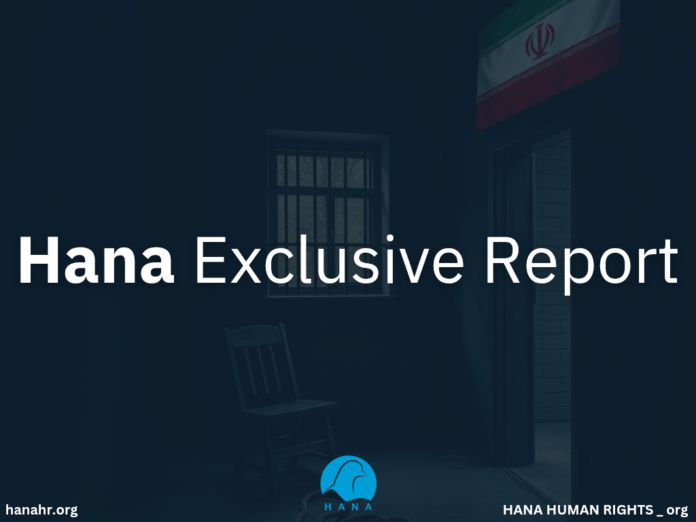The right to life is the most fundamental human right — without it, no other human right can be meaningfully enjoyed. That is why no other right is as widely protected across international human rights instruments. The logic is clear: all human rights are created for individuals who are alive; when life is taken, the very foundation of human rights collapses.
Despite the centrality of this right, the Islamic Republic of Iran has consistently ranked among the world’s top violators of the right to life. This is particularly true in the case of Kurdish citizens, who have faced systematic and continuous violations since the establishment of the Islamic Republic.
One of the most alarming manifestations of this violation is the extrajudicial killing of Kurdish political prisoners.
In its latest investigation, the Hana Human Rights Organization confirms three cases of extrajudicial killings that occurred while the individuals were in custody or under the supervision of Iranian security forces. These findings are based on field interviews, eyewitness testimonies, and statements from family members.
Case 1: Fouad Alikhani – Death Under Torture in IRGC Intelligence Detention
- Name: Fouad Alikhani
- Age: 41
- Residence: Kermanshah
- Date of Arrest: June 21, 2025
- Detaining Authority: IRGC Intelligence
- Legal Status: Arbitrary detention – No official warrant – Body not returned – No official explanation
Fouad Alikhani, a father of two and a merchant in Kermanshah, had no prior political or criminal record. His family described him as calm and non-political. He was arrested by plainclothes IRGC agents without any formal warrant.
According to the family, Fouad was subjected to severe physical torture while in custody and died as a result. His body has not been returned, and no security or judicial authority has offered an official explanation. The family has also been threatened and barred from publicly speaking out.
Case 2: Salar Khalandi – Suspicious Death After Release from Detention
- Name: Salar Khalandi
- Age: 31
- Residence: Bukan, West Azerbaijan Province
- Date of Arrest: June 16, 2025
Salar Khalandi, son of Mohammad and Jamileh, had no political background. He was arrested by security forces and subjected to three days of intense psychological and physical abuse.
Upon his release, he returned home with visible bruises and in a severely deteriorated condition. Less than 24 hours later, he died under suspicious circumstances.
Security agencies have reportedly pressured the family into remaining silent and refraining from pursuing any legal inquiry.
Case 3: Ghader Rasoulpour – Suspicious Death on the Eve of Release from Mahabad Prison
- Name: Ghader Rasoulpour
- Age: In his 60s
- Political Affiliation: Former member of Komala Party of Iranian Kurdistan
- Date of Arrest: February 9, 2025
- Date of Death: July 17, 2025 (one day before his scheduled release)
- Place of Detention: Mahabad Central Prison
- Official Cause of Death: Seizure in the prison shower (official claim)
Ghader Rasoulpour had spent roughly nine years in Iranian prisons over the course of his life due to his political activities. In 2025, he was sentenced to six months in prison and was scheduled to be released on July 18.
Just one day before his release, prison officials called his family to inform them that he had allegedly died of a seizure in the shower. His family and fellow inmates have strongly disputed this account, stating that he was in good health. His body was not returned, and no independent autopsy or investigation was conducted.
Systemic Violations and Legal Implications
These three documented cases highlight serious violations of fundamental human rights, including:
- The right to life under Article 6 of the International Covenant on Civil and Political Rights (ICCPR)
- The prohibition of torture and cruel, inhuman or degrading treatment under Article 7 of the ICCPR
- Violations of the UN Standard Minimum Rules for the Treatment of Prisoners (Nelson Mandela Rules)
The failure to provide transparent information, conduct independent autopsies, or return bodies to families also violates the right to truth and the principle of accountability in international law.
Moreover, the threats and intimidation of families stand in direct contradiction to human rights principles related to the protection of victims’ survivors.
These killings do not exist in a vacuum — they are part of a broader pattern of systemic repression and structural rights violations. Similar patterns were widely reported during the “Jina Uprising” (2022), when numerous detainees died shortly after being released, and state narratives regularly contradicted independent reports.
To this day, no transparent judicial proceedings or impartial forensic investigations have taken place in such cases.
HANA Human Rights Organization Calls for Immediate Action
Hana urges:
- An independent, impartial, and transparent investigation into the deaths of the three Kurdish citizens
- Official accountability from Iranian security and judicial bodies
- Legal and psychological support for the families of the victims
- Recognition of families’ right to the truth
- Creation of international monitoring mechanisms, particularly for undocumented detention facilities in Kurdistan not listed under Iran’s official prison registry
HANA Human Rights Organization
July 2025

